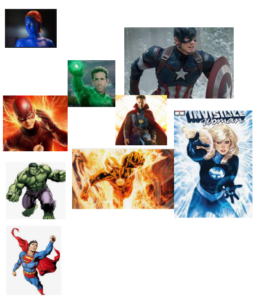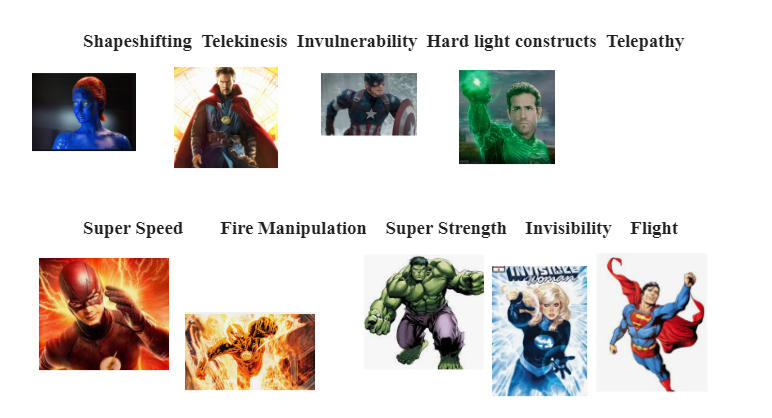1. Read and match
| 1). Super Strength: | a). He could leap over an 8th of a mile or over a tall building. |
| 2). Super Durability: | b). Superman could run faster than an express train. |
| 3). Super Speed: | c). Superman was highly resistant to injury. However, he was not so invulnerable as in his modern depictions; although immune to conventional firearms, heavy artillery could injure him. |
| 4). Enhanced Leaping | d). Superman’s eyesight and hearing were far in excess of a human being’s. |
| 5). Super Senses: | e). The character was depicted as having the ability to move large vehicles, including cars, trains, and ships. |
Super – супер, надзвичайний, неймовірний
Super Strength – надзвичайна сила
Super Speed – надзвичайна швидкість
Enhanced Leaping – покращений стрибок
Super Durability – надзвичайна міцність
Super Senses – надзвичайні відчуття
What are the main senses of a human ?
Although traditionally around five human senses were known (namely sight, smell, touch, taste, and hearing) watch the video and tell what superpowers were mentioned there ? Translate all the senses into the ukrainian language.
Telekinesis
Invulnerability
Hard light constructs
Telepathy
Super Speed
Fire Manipulation
Super Strength
Invisibility
Flight
Shapeshifting
Match the names with the pictures
Doctor Strange
Captain America
Green Lantern
Flash
Human Torch
Hulk
Invisible woman
Superman
Match the pictures to the super power heroes have
Grammar spot
The second conditionals
The second conditional is used to imagine present or future situations that are impossible or unlikely in reality.
If + Past Simple , would + Present Simple
Example,
If I were you, I would drink tea instead of cola
I wouldn’t eat so much ___ if I were you
If clause – condition. Main clause – result
If we had a garden, we could have a cat.
If I won a lot of money, I’d buy a big house in the country.
I wouldn’t worry if I were you.
Note!
If + Past Simple , would/could/might + Infinitive
If I were a superhero, I would …
If I made a superhero, he could …
If I were a superhero, my superpower would be: ……….
Task 1
Watch this video and complete exercises
Exercise 1
1). If you had more time, what _________ you do?
2). If you _____ (know) how to cook, would you open a restaurant?
3). I _______ fly to Italy if I had a ticket.
4). He ______ buy Lamborghini, if he _____ (have) money.
Task 2
If you were a superhero, who would you be?
BBQman ?
Exercise on Grammar
Here are exercises practice the second conditional, along with sample answers:
Exercise 2: Fill in the Blanks
Instructions: Fill in the blanks with the correct form of the verbs in the second conditional.
- If I __________ (win) the lottery, I would travel the world.
- She __________ (buy) a house if she had enough money.
- If it __________ (rain) tomorrow, we would stay indoors.
- They __________ (visit) their grandparents if they had more free time.
- He __________ (learn) to play the guitar if he had the opportunity.
Answers:
- won
- would buy
- rained
- would visit
- would learn
Exercise 3: Complete the Sentences
Instructions: Complete the sentences using the second conditional form of the verbs provided.
- If she studied harder, she __________ (get) better grades.
- I __________ (travel) to Japan if I had enough vacation time.
- They __________ (attend) the concert if they had bought tickets earlier.
- If you had more money, you __________ (buy) a new car.
- He __________ (learn) French if he took classes regularly.
Answers:
- would get
- would travel
- would attend
- would buy
- would learn
Exercise 4: Write Your Own Sentences
Instructions: Create sentences using the second conditional based on the prompts given.
- Prompt: If you had the chance to meet any historical figure, who would you meet?
- Example Response: If I had the chance, I would meet Albert Einstein.
- Prompt: If you could live anywhere in the world, where would you live?
- Example Response: If I could live anywhere, I would live in Paris.
- Prompt: If you won a million dollars, what would you do?
- Example Response: If I won a million dollars, I would travel around the world.
https://wordwall.net/resource/33924983
Watch this video and find second conditional in the song
For teachers
Lesson Title: Exploring the Second Conditional
Objective:
- Understand the structure and usage of the second conditional.
- Practice forming sentences in the second conditional.
- Apply the second conditional in hypothetical scenarios.
Materials Needed:
- Whiteboard/Flipchart
- Markers
- Handouts with exercises and scenarios
Lesson Outline:
1. Introduction (10 minutes)
- Begin the lesson by discussing the purpose of the second conditional: talking about unreal or hypothetical situations in the present or future.
- Present the structure: “If + past simple, would + base verb.”
- Write examples on the board and elicit responses from students to ensure understanding.
2. Examples and Explanation (15 minutes)
- Provide various examples using different subjects and verbs.
- Discuss the differences between the zero, first, and second conditionals to highlight how the second conditional is used specifically for unreal or improbable situations in the present or future.
3. Guided Practice (15 minutes)
- Distribute worksheets or handouts with fill-in-the-blank exercises in the second conditional.
- Monitor students as they work on the exercises, providing assistance where needed.
4. Application and Discussion (15 minutes)
- Engage students in a discussion using hypothetical scenarios:
- “If you won a million dollars, what would you do?”
- “If you could travel anywhere in the world, where would you go?”
- “If you could change one thing about the world, what would it be?”
- Encourage students to respond using the second conditional, fostering conversation and creativity.
5. Group Activity (10 minutes)
- Divide students into groups and provide each group with a scenario card.
- Ask them to create a short skit or dialogue using the second conditional to present their scenario.
- Encourage creativity and originality in their presentations.
6. Recap and Conclusion (5 minutes)
- Summarize the key points of the lesson: the structure of the second conditional and its use in hypothetical situations.
- Encourage students to practice using the second conditional in their daily conversations or written exercises.
Homework (Optional):
- Assign a few exercises or scenarios for students to practice forming sentences in the second conditional.
Assessment:
- Evaluate students’ understanding through their participation in discussions, completion of exercises, and performance in the group activity.


